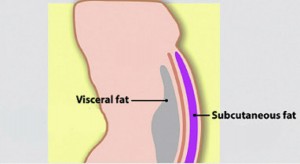You need to address four areas for a
successful and sustainable weight loss program.
By Suheil Khuri M.D.
 1.Diet: The composition of the healthiest diet is not known, however, total ingested calories are the critical factor for weight loss. You need to also know that:
1.Diet: The composition of the healthiest diet is not known, however, total ingested calories are the critical factor for weight loss. You need to also know that:
a. Lower calorie diet tends to cause greater loss of fat mass. However, excessive low calorie intake is not healthy and is not advised.
b. Higher intake of proteins results in a greater retention of fat-free body mass (muscle sparing).
c. Greater fat loss is expected in more obese individuals using the same calorie diets than in less obese individuals.
Low fat diets, specialized diets, meal replacement diets, and low carbohydrate diets lead to significant weight reduction but recent research has focused more on low carbohydrate diets. Dietary adherence is shown to be a more important factor than the type of diet itself.
Meal Replacement can be very helpful especially when the individual tends to crave sugars or other non-healthy foods. Meal replacements can be used as a full meal replacement, as a part of a meal, or a snack to avoid non-healthy food cravings.
2. Behavior / Habit: To be able to maintain your weight loss, you must make several lifestyle and habit changes. The following lifestyle / habit changes are needed:
• Self-monitoring your progress regularly.
• Develop methods to recover from overeating or weight regain.
• Avoid foods and situational triggers that prompt eating.
• Portion control.
• Decrease the negative impact of stress on positive behavioral patterns by:
1. Relaxation training: Music, yoga, meditation,
or your own ways.
2. Stress reduction: deep breathing, walking,
and exercising.
• Prepare for special events and substitute one food for another.
• Avoid mindless eating.
• Change your shopping habits for healthier foods.
• Think in a positive manner and replace thoughts that undermine weight management efforts and congratulate yourself on successes and not mistakes.
• Expect setbacks and be prepared for them but look at them as temporary.
Changing a habit takes 4 weeks to install and 1 – 2 years to make permanent.
3. Physical Activity: This is very important factor in a successful weight loss program and especially in maintaining your weight loss. Need to consider:
• Moderate aerobic exercise: 150 minutes/week (30 minutes 5X/week). Should be performed in episodes of at least
10 minutes and preferably all through the week. Additional health benefits and weight loss are provided by increasing to 300 minutes a week of moderate intensity aerobic physical activity.
• Muscle strengthening activities that involve all major muscle groups performed on 2 or more days per week.
4. Medications/Supplements: Medications used for weight loss are primarily ones that suppress the appetite. Their exact mechanism of action to induce weight loss is unknown. Those medications have been used for prolonged periods of time (up to 21 yrs. with Phentermine) with little to no risk of abuse or misuse, minimal side effects, cravings or withdrawal symptoms after cessation.
If following the previous three areas does not provide adequate weight loss, consult your doctor or a weight loss program to see if you are a candidate for adding medications/supplements to help you achieve your goal.
At 2 years: appetite suppressant medications study showed a 9% – 10% initial body weight loss compared to placebo which showed a 1.8% initial body weight loss. The treated group showed also improved cardiovascular problems and decreased incident of diabetes.
Other drugs that are used in obesity treatment help in dealing and addressing the co-morbidities associated with weight loss especially diabetes and especially in the development of Insulin resistance.
Dr. G’s Weight Loss Center
901 W Indiantown Rd., Suite 12.
Jupiter, FL 33458
561-427-2232
 South Florida Health and Wellness Magazine Health and Wellness Articles
South Florida Health and Wellness Magazine Health and Wellness Articles




